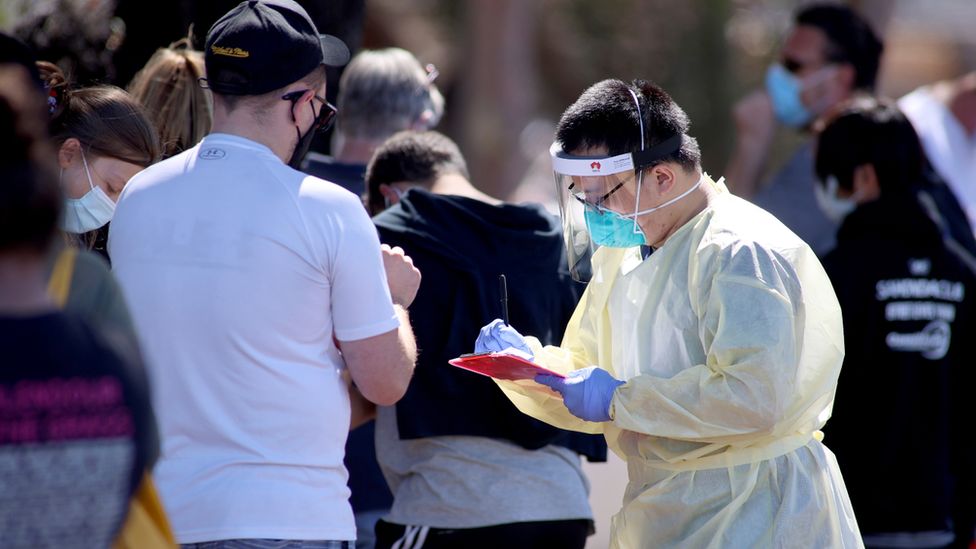Covid-19: South Australia to enter 'circuit breaker' lockdown
- Published

The state of South Australia will enter an immediate six-day lockdown to curb the spread of a coronavirus outbreak discovered days ago.
The state has detected 36 cases since infections were found in Adelaide on Sunday, the first community cases detected in six months.
Authorities say the "circuit breaker" measures were necessary to stop the virus' spread "at the beginning".
Australia has previously also responded aggressively to small outbreaks.
Various state governments have at times closed parts of the economy, enforced border restrictions and other measures to stop the virus' spread.
The lockdown, to begin at midnight on Wednesday, comes just weeks after neighbouring state Victoria beat a second wave, which caused about 800 deaths.
South Australia's restrictions from Thursday 19 November
- People must stay home and cannot leave for exercise
- Mask-wearing to be mandatory in public
- All schools and universities closed except for children of essential workers
- Shops, restaurants, cafes and pubs closed with no takeaway options
- Bans on regional travel
There would be a further eight days of lesser restrictions following the "six day pause", officials said.
Almost immediately after the lockdown announcement, images on social media showed people queuing at supermarkets to buy toilet paper and other supplies.
Authorities had urged people to avoid panic-buying, confirming supermarkets and pharmacies would remain open.
Allow Twitter content?
This article contains content provided by Twitter. We ask for your permission before anything is loaded, as they may be using cookies and other technologies. You may want to read Twitter’s cookie policy, external and privacy policy, external before accepting. To view this content choose ‘accept and continue’.
South Australia's Premier Stephen Marshall called on residents to "rise to the challenge again" in the sudden, second lockdown.
"We need a circuit breaker to stay ahead of this," he said. "We need breathing space for contact tracing to protect the elderly, to protect the vulnerable, to protect our entire community."
On Wednesday, the state reported two new cases out of 9,500 tests. Officials said it was a "small but critical" number.
Most Australian states had already moved this week to shut their borders to South Australian residents.
Quarantine leaks
Like Victoria's outbreak, the re-emergence of the virus in South Australia has come from a hotel quarantine site. This has prompted re-examination of quarantine safety measures.
Officials said a cleaner had become infected and spread it to people in the local community.
Australia closed its borders to international travellers in March but has allowed citizens and permanent residents to return home if they undergo a mandatory 14-day quarantine in a hotel.
About one-fifth of the country's cases have been found in returning travellers.
Prime Minister Scott Morrison on Wednesday said South Australia's speedy move "draws on lessons from earlier outbreak experiences".
Australia, which has reported 907 deaths and about 28,000 cases had in recent weeks seen its cases drop to near zero after Victoria's successful suppression of the virus.
Coping with Melbourne lockdown: 'I cycled every street in my 5km radius'
However that effort had required a stringent four-month lockdown of state capital Melbourne, where residents could not freely leave their homes and faced a curfew.
The state was able to reduce its case rate to zero from a peak of 700 new cases per day in that period. Its full lockdown began when nearly 100 new cases were being reported per day.
- Published26 October 2020
- Published1 November 2020
- Published18 October 2020